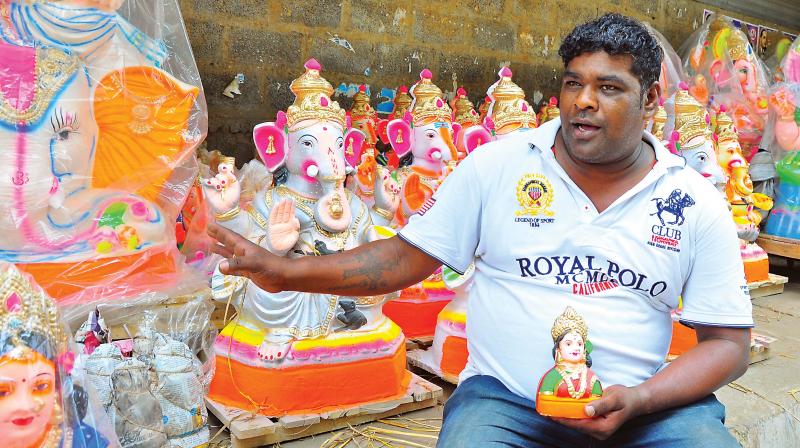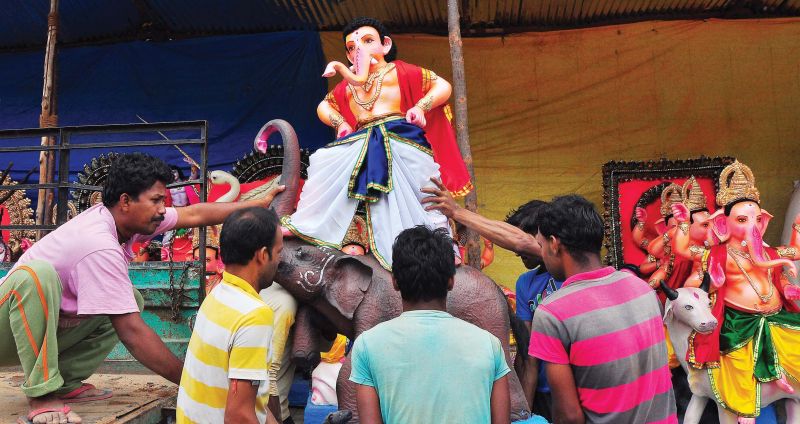Urban Legend: For Lawrence, the Ganesha idol maker, there's no obstacle too big

The KSPCB’s ban on Plaster of Paris Ganesha idols means a tremendous loss for artisans who make the long trek from Bengal every season, with several of them deciding to give Bengaluru a miss this year. Amidst the handful who remain is Lawrence, a local craftsman, who learned the trade from his Hindu friends. Business might be slow, he tells Aksheev Thakur, but the warm memories he has associated with the festival season keep him coming back
Less than a fortnight before Ganesh Chaturthi, Pottery Road, the hub of festival merchandise, makes for a sombre sight. The stench from the canal nearby FOLLOWS ONE down the narrow lane, where vegetable and fruit sellers jostle for space with the area's most recent entrants - the potters who make idols. Every year, Pottery Town is home to some 50,000 idols of all shapes, sizes and varieties, with 16 foot Ganeshas towering down on their less imposing counterparts.
This year is different. In 2016, the Karnataka State Pollution Control Board declared a blanket ban on Plaster of Paris idols: a commendable move towards saving what's left OF our city's ecosystem, albeit one that cost hundreds of craftsmen their livelihoods. Clay idols as high as six feet tall line the street, a far cry from the brightly painted novelty models that have proved so popular. The ban has caused significant losses to these traders, many of whom have skipped their rounds of Bengaluru this year.
Lawrence, a local potter, sits amidst the other artisans, many of whom are busy at work sculpting or putting the final touches of paint on the finished idols. "Yes, it is a loss, but nothing is more important than the lives of children, who will be affected by the polluted water in which these idols have been immersed," he said. A Christian by faith, his Hindu friends introduced him to the craft: "The festival has always been close to my heart, it has a strong emotional resonance. And I'm an Indian, at the end of the day. That's why I'm here, losses notwithstanding."
The ban has caused a certain ire among the craftsmen, also because consumers continue to clamour for the Plaster of Paris idols. "PoP has disastrous ecological consequences," explained Lawrence. "The chemicals in the paint destroy aquatic life, although the idols are not affected during the rains." Clay, despite the benefits it provides to the craftsmen, requiring only a tenth of the investment that PoP does, simply doesn't have the same draw. "This year, will make a 90% loss, considering the dip in production as well. Our profits usually hover around Rs 5 lakh, but our expectations are nowhere near that amount this year."

The clay models also don't get any bigger than six feet. They cant be compared, perhaps, with the grandeur of a towering, brightly coloured pandal. Producing clay models that look as good is a niche that Lawrence is attempting to carve for himself. "The biggest drawback of using clay is that it takes a long time to dry. We can't make more than 15 idols a day. The production of PoP idols, however, can go upto 500 idols in a single day!" This is what keeps the artisans, many of whom make only Ganesha idols all year round, stick to PoP despite being aware of its ramifications. PoP is also unaffected by water, while clay dissolves quickly into a muddy mess with a single rain. The blue tarpaulin flung over the makeshift stalls in which these craftsmen work stands, testament to their woes.
"The trouble is that there is no awareness among the people themselves," laments Lawrence. "The government should have taken pains to do this, because nobody seems to know what the KSPCB is or why this rule has been imposed. The Goa and Puducherry governments worked extensively on an awareness programme that taught people the impact of PoP. It reduced demand for the material. That method might make a lot more sense than cracking down solely on manufacturers, who are simply trying to match demand." This, he feels, will give rise to black market, with PoP idols smuggled in from Maharashtra, where no such ban exists.
At a time when identity politics plague the nation, Lawrence is the epitome of secularism. "My contribution to this trade has earned me a lot of praise. And it's more than a business to me. People from all faiths applaud my work and their belief in me is the biggest compliment I can hope to receive," he smiled.

